Oxford Church Text Books (19 vols.)
Digital Logos Edition
Overview
The Oxford Church Text Books series is an exceptional collection of church history and doctrine by early-twentieth-century writers and theologians. Noted authors such as G. H. Box, Leighton Pullan, and A. E. Burn offer over 2,500 pages of clear and concise prose covering subjects ranging from early church history to doctrine, the sacraments, the Reformation, and more.
With Logos Bible Software, these valuable volumes are enhanced by cutting-edge research tools. Scripture citations appear on mouseover in your preferred English translation. Important terms link to dictionaries, encyclopedias, and a wealth of other resources in your digital library. Powerful topical searches help you find exactly what you’re looking for. Tablet and mobile apps let you take the discussion with you. With Logos Bible Software, the most efficient and comprehensive research tools are in one place, so you get the most out of your study.

- Historical outlines of the church in Great Britain, including early church history
- Expositions on the Apostles’, Athanasian, and Nicene Creeds
- Various explanations of doctrine
- Title: Oxford Church Text Books
- Series: Oxford Church Text Books
- Volumes: 19
- Pages: 2,588
- History of the Church to AD 325 by H. N. Bate
- Early Christian Doctrine by Leighton Pullan
- The Hebrew Prophets by Robert L. Ottley
- Outlines of Old Testament Theology by C. F. Burney
- An Elementary History of the Church in Great Britain by William Holden Hutton
- The Reformation in Great Britain by Leighton Pullan and H. O. Wakeman
- The History of the Book of Common Prayer by J. H. Maude
- The Continental Reformation by B. J. Kidd
- A Manual for Confirmation by T. Field
- The Church, Its Ministry and Authority by Darwell Stone
- A History of the American Church to the Close of the Nineteenth Century by Leighton Coleman
- The Future State by S. C. Gayford
- Evidences of Christianity by Lonsdale Ragg
- The Apostles’ Creed by A. E. Burn
- The Teaching of Our Lord by Leighton Pullan
- The Athanasian Creed by A. E. Burn
- The Nicene Creed by A. E. Burn
- A Short History of the Church in Scotland by Anthony Mitchell
- A Short Introduction to the Literature of the Old Testament by G. H. Box
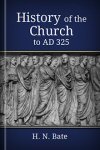
In History of the Church to AD 325, author H. N. Bate begins with an account of the Roman world and Jewish religion, believing it a base for Christian history. He follows with 10 additional chapters covering the Apostolic age, Jewish Christianity, gnosticism and montanism, apologists of the second century, church and state from Hadrian to Commodus, the churches of Rome and Alexandria, church and state from Septimius Severus to Constantine, the Council of Nicaea, and the church calendar. While, scholarly, this volume is easy to read and includes a helpful chronological table.
Mr. Bate has succeeded beyond belief. He has produced one of the best volumes of the series.
—Expository Times
The reputation of this series is not only maintained but enhanced by Mr. Bate’s excellent compendium of early Church history.
—Saturday Review
H. N. Bate was the vicar of St. Stephen’s, Hampstead, and examining chaplain to the bishop of London. He also co-authored tract XXIV of the Alcuin Club, Thoughts on the Shape of the Liturgy and Faith and Order: Proceedings of the World Conference, Lausanne.
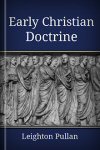
In this volume, Leighton Pullan outlines a sketch of Christian doctrine from its earliest times until the Council of Chalcedon in AD 451, addressing among other things the doctrines of incarnation, the trinity, the atonement, and the sacraments.
An admirable sketch.
—Guardian
Theological students owe a debt of gratitude to Mr. Pullan for this admirable little work.
—Oxford Magazine
Leighton Pullan (1865–1940) was a lecturer in theology at St. John’s and Oriel Colleges, Oxford. His works include The Atonement, The History of the Book of Common Prayer, The History of Early Christianity, Early Christian Doctrine, and The Church of the Fathers.
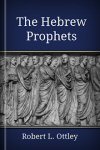
In The Hebrew Prophets, Robert L. Ottley discusses the meaning, origin and early history of prophecy, prophets and prophecy from 700 BC through the exile, post-exilic prophecy, and the Messianic hope.
This handy little book is written with the clearness and good taste which habitually mark Mr. Ottley’s work, and it contains much useful information in a short form.
—Church Quarterly Review
Robert L. Ottley (1834–1909) was fellow of St. Mary Magdalene College and principal of the Pusey House, Oxford. His works include A Short History of the Hebrews, Aspects of the Old Testament, and The Rule of Faith and Hope.
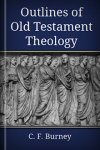
C. F. Burney begins his Outlines of Old Testament Theology with an exposition of the composition and dates of the books of the Old Testament. He then discusses the names of God; God’s dwelling place; the covenant relationship between God and Israel (both outward conditions and moral requirements); the theocratic state; and God’s relationship to Israel, the individual, and the world.
Is very important, and answers a great need. . . . He is thoroughly constructive, and shows how edifying and helpful the new science of the Old Testament really is. We know of no other book at a popular price doing the same thing.
—University Correspondent
C. F. Burney (1868–1925) was educated at Merchant Taylors’ School and at St. John’s College, Oxford. Burney went on to become Oriel Professor of the Interpretation of Holy Scripture at Oxford. He was also canon of Rochester and fellow of St. John Baptist's College in Oxford. He was the author of several titles, including Outlines of Old Testament Theology, Israel’s Settlement in Canaan, The Aramaic Origin of the Fourth Gospel, and The Poetry of Our Lord.
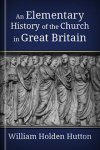
In An Elementary History of the Church in Great Britain, William Holden Hutton reviews the history of the church, beginning in the fourth century and continuing through the medieval times, the Reformation, the Stewarts, and the eighteenth and nineteenth centuries.
Mr. Hutton has very happily combined the scholarly and the popular elements in his narrative.
—Church Quarterly Review
It is quite the best ‘Elementary’ History of the Church in this land that we have.
—Guardian
William Holden Hutton (1860–1930) was educated at Magdalen College, Oxford, and became a tutor and fellow at St John’s College. From 1919 to 1930, he was dean of Winchester cathedral. His works include Sir Thomas More, The Age of Revolution: Being an Outline of the History of the Church from 1648 to 1815, and The Hope of Man.
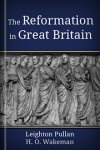
The Reformation in Great Britain, begun by H. O. Wakeman and finished by Leighton Pullan after Wakeman’s death, provides an account of the Reformation in both England and Scotland. It pays particular attention to doctrine, with the goal of illustrating the thoughts and actions behind the Reformation. Traversing the breach with Rome through the reigns of various monarchs, this volume provides an excellent overview of the historical context surrounding the Reformation and it's development in Great Britain.
This little book will do much to remove all sorts of wrong ideas about the period of change, and also, its chief merit to us, provide people with a better view of the relations between the Scottish and English Reformers than is found in most works on the period.
—Church Times
Leighton Pullan (1865–1940) was a lecturer in theology at St. John’s and Oriel Colleges, Oxford. His works include The Atonement, The History of the Book of Common Prayer, The History of Early Christianity, Early Christian Doctrine, and The Church of the Fathers.
H. O. Wakeman, or Henry Offley Wakeman (1852–1899) was a fellow of All Souls’ College, Oxford, and wrote several historical books and essays, including Life of Charles James Fox and The History of Religion in England.
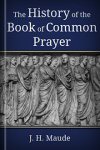
In his History of the Book of Common Prayer, J. H. Maude covers the historical context surrounding the creation of the Book of Common Prayer, a tool for English clergymen that contains all the public services in a single book.
May be highly commended.
—Canadian Churchman
So far as we know, there is no ‘History of the Book of Common Prayer’ more full of information or more trustworthy than that which the ready pen of the Rev. J. H. Maude has given us.
—Church Times
J. H. Maude (died 1927) was fellow, dean, and lecturer of Hertford College, Oxford, and examining chaplain to the Lord Bishop of St. Albans.
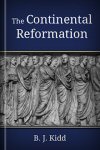
In The Continental Reformation, B. J. Kidd covers the German Reformation, the Swiss Reformation, and the extent and influence of the Reformation, with appendixes on the territorial expansion of Protestantism and the Reformed.
Mr. Kidd has given a masterly survey of his subject. . . . It is no disparagement of the other volumes of the series to say that this on more than maintains the high standard of excellence which has hitherto marked the series.
—Scottish Guardian
B. J. Kidd, or Beresford James Kidd (1864–1948), was an Anglican priest, church historian, and warden of Keble College, Oxford. He also served as a tutor to non-collegiate students at Oxford. His other works include The Continental Reformation and The Later Mediaeval Doctrine of the Eucharistic Sacrifice.
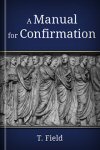
In A Manual for Confirmation, T. Field warns against the casual undertaking of confirmation as a formality, stating, “We must never forget that though the actual presentation of ourselves for Confirmation has been made easy for us, the real preparation means a great choice, and the choice involves a great struggle.” This manual covers what Field views as the two sides of Confirmation—God’s gift and our obligation—and the preparation of mind and heart to enable participants of the sacrament to receive the gift and carry out the duty.
Will be of the very greatest value to schoolmasters who are entrusted with the important duty of preparing public schoolboys for Confirmation, and as a book to be put in the hands of the candidates themselves, his manual is, we think, an improvement on any with which we are acquainted.
—Guardian
T. Field was warden of St. Peter’s College, Radley, and sometime fellow of St. Mary Magdalen College, Oxford.
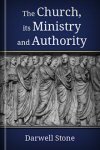
In The Church, Its Ministry and Authority, Darwell Stone gives a clear and concise overview of the facts and doctrine with regard to the church, contained both in Scripture—such as the Gospels and Acts—and in history.
It briefly and clearly conveys much information concerning the facts and doctrine contained in the Bible, and later history, with regard to the Church.
—Morning Post
Darwell Stone (1859–1941) was a man of exceptional learning, spiritual insight, and political shrewdness. An Anglo-Catholic theologian, he was arguably the greatest principal of the Pusey House, where he served from 1909 to 1934. His best-known work is A History of the Doctrine of the Holy Eucharist, though he published many influential works of theology.
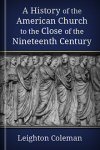
Leighton Coleman wrote A History of the American Church to the Close of the Nineteenth Century with the idea that it would circulate in both Great Britain and America. He covers the American Episcopate, the eighteenth and nineteenth centuries, the church and the Wesleys, the bishops and independence, the church revival, missions, and education and progress. He includes a list of presiding bishops of the American church.
It gives a lucid and interesting account of a chapter of Church history only ill understood in this country. . . . The book forms a valuable accession to the series in which it appears.
—Scotsman
Leighton Coleman (1837–1907) was an American Episcopal clergyman who also lived in England. He graduated from the General Theological Seminary in New York. After serving as rector in various places he traveled to England for a time, and upon his return was ordained bishop of Delaware in 1888. Among his works are The Church in America and A History of the Lehigh Valley.
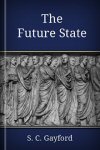
In The Future State, S. C. Gayford expounds upon the idea of a future life, reviewing both the Jewish belief before Christ and subsequent Christian teaching.
As a comprehensive elementary text book on a very difficult subject, this book quite comes up to, if it does not surpass, the standard already attained in the series.
—Guardian
S. C. Gayford was vice-principal of Cuddesdon College.
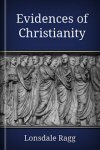
Lonsdale Ragg defines Evidences of Christianity as “those matters that lie at the foundation of our belief”: God, Jesus Christ, The Holy Spirit, and the church.
Mr. Ragg has done his work well. He presents his arguments lucidly and calmly, and exhibits the whole of the Christian system centred in the fact of the Incarnation.
—Church Times
Lonsdale Ragg (1866–1945) was prebendary and vice-chancellor of Lincoln Cathedral and sometime warden of Bishop’s hostel, Lincoln. He was a writer, translator, and illustrator. Among his works are Dante and His Italy and Things Seen in Venice.
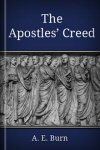
In The Apostles’ Creed, A. E. Burn discusses the history and teaching of the Creed, including theories of its origin and teachings on the doctrines of God, the incarnation, the person, and the work of the Holy Spirit. He also offers a short historical commentary to connect the history and the teachings.
Dr. Burn does all his work to perfection. This will be the student’s introduction to the Apostle’s Creed for years to come.
—Expository Times
The result of Dr. Burn’s minute and prolonged research into the problems of the history of the Creeds are offered here in a form that is at once easily intelligible and attractive.
—Journal of Theological Studies
A. E. Burn, or Andrew Ewbank Burn (1864–1927), was a theologian and clergyman in the Church of England. He served various posts throughout his career and was appointed dean of Salisbury in 1920, where he remained until his death. His works include The Athanasian Creed, The Crown of Thorns, and The Nicene Creed.
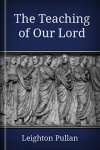
In The Teaching of Our Lord, Leighton Pullan offers a scientific study of the Gospels, based on the most recent research of his day. Pullan covers such topics as Christ’s method and his teachings on Jewish law, God the Father, the Kingdom of God, the Holy Spirit, and more.
Mr. Pullan has succeeded in packing into the little book an immense amount of matter, and in spite of all that has been written on the subject, he has presented it in some fresh aspects.
—Expository Times
Leighton Pullan (1865–1940) was a lecturer in theology at St. John’s and Oriel Colleges, Oxford. His works include The Atonement, The History of the Book of Common Prayer, The History of Early Christianity, Early Christian Doctrine, and The Church of the Fathers.
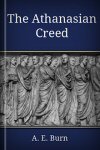
The Athanasian Creed covers the history and authorship of the Creed, and its teaching on the doctrine of the Holy Trinity and Incarnation. It includes the Latin and Greek versions, as well as the earliest MSS and commentaries in the appendixes.
Into this little book Dr. Burn has packed an extraordinary amount of material, and, what is still more remarkable, he has done so without producing any sense of heaviness. It is told as lightly as fully.
—Interpreter
A. E. Burn, or Andrew Ewbank Burn (1864–1927), was a theologian and clergyman in the Church of England. He served various posts throughout his career and was appointed dean of Salisbury in 1920, where he remained until his death. His works include The Apostles’ Creed, The Crown of Thorns, and The Nicene Creed.
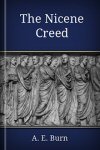
The Nicene Creed covers the history and theology of the Creed, including the Council of Nicaea, ante-Nicene theology, and doctrines on Incarnation, God, the Holy Ghost, the church, and the sacraments. The Greek and Latin texts of the Creed are also included.
A scholarly little work, distinguished by the best features of the series. May readers will be grateful to Dr. Burn for his lucid exposition of an important subject.
—Scotsman
A. E. Burn, or Andrew Ewbank Burn (1864–1927), was a theologian and clergyman in the Church of England. He served various posts throughout his career and was appointed dean of Salisbury in 1920, where he remained until his death. His works include The Athanasian Creed, The Crown of Thorns, and The Apostles’ Creed.
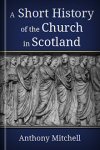
A Short History of the Church in Scotland
- Author: Anthony Mitchell
- Series: Oxford Church Text Books
- Publisher: Rivingtons
- Publication Date: 1907
- Pages: 118
A Short History of the Church in Scotland covers Christianity in Scotland from the fourth century through 1905.
This little book is by far the best short history of the Scottish Church that has come into our hands.
—Guardian
Anthony Mitchell (1867–1917) was a Scottish clergyman and author. A graduate of King’s College, Aberdeen, Mitchell served as a chaplain during the Boer War, under Lord Kitchener. He became canon and then chancellor of St. Mary’s Cathedral, Edinburgh, before becoming lord bishop of Aberdeen and Orkney, Scotland, a position he held until his death. In 1914, he delivered the Hale lectures at the University of Chicago. Among his works are Verse: Tatters from a Student’s Gown and Biographical Studies in Scottish Church History.
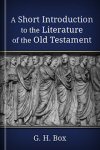
A Short Introduction to the Literature of the Old Testament
- Author: G. H. Box
- Series: Oxford Church Text Books
- Publisher: Rivingtons
- Publication Date: 1919
- Pages: 143
A Short Introduction to the Literature of the Old Testament was written by theologian G. H. Box, who wrote several books on Christian theology as well as articles for the 1911 Encyclopedia Britannica.
It contains an amazing amount of matter. And what is more wonderful at the money, every line of it has cost the author time to investigate and time to set it down succinctly. For Mr. Box is one of our most conscientious scholars.
—Expository Times
G. H. Box (1869–1933) was rector of Sutton Sandy, Bedfordshire, and a lecturer of theology at the University of Oxford. He is the author of numerous works, including The Spiritual Teaching and Value of the Jewish Prayer Book, The Virgin Birth of Jesus, The Apocalypse of Abraham, and Introduction to the Canonical Books of the Old Testament.
Reviews
3 ratings
Curtis Dubreuil
10/28/2014
AeliusCicero
10/22/2014

Larry Proffitt (I
10/6/2014